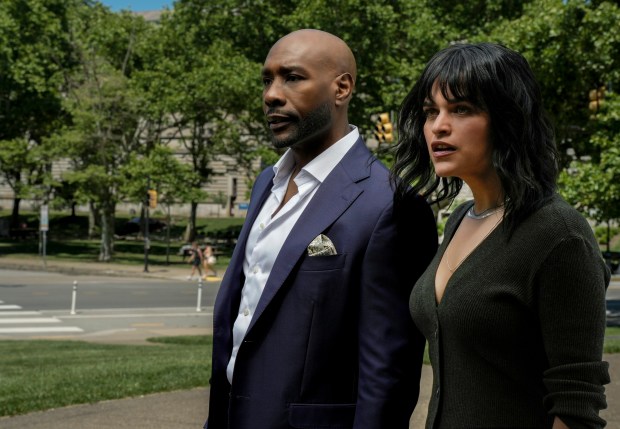Network television would be unrecognizable without a lineup of hospital dramas. It’s a hardy genre for a reason. In the CBS series “Watson,” Morris Chestnut plays Dr. John Watson — that’s right, Sherlock Holmes’ old pal — but he is no longer the loyal sidekick of Arthur Conan Doyle’s stories, but at the forefront of his own medical procedural. On paper, these ingredients seem promising: A riff on the Sherlock template and a likable star in Chestnut. And yet neither is enough to make the show work.
Set in present-day Pittsburgh — why Pittsburgh? — Sherlock is presumed dead (somewhere at the bottom of the Reichenbach Falls) and he’s left Watson a considerable inheritance. The money is for a clinic, allowing Watson to return to his original profession and assemble a small group of young physicians who help him solve medical mysteries. If only his colleagues were given the kind of qualities that suggest they’re people rather than dialogue-delivery machines. One character’s primary trait seems to be that she has a Texas accent. “Everyone who comes into this clinic is a puzzle,” Watson tells them. “They don’t need doctors — doctors are everywhere — our patients need detectives.”
Setting aside that “House” already did a fairly entertaining version of this, it’s a silly pronouncement: Many people have health conditions that aren’t easily diagnosable. This isn’t rare or unusual. In fact, it’s the basis of every medical show ever. But just in case you weren’t following along, when Watson details a patient’s ailments, he’s compelled to spell it out once again: “It sounds like a mystery and mysteries are what we do.”
Is it off-putting that one of the doctors complains about her boyfriend not proposing while they’re supposed to be diagnosing a little girl’s problems? I mean, yeah, because we have no investment in these people, so framing the moment as a funny bit of character banter fails to land. Everything is a posture. Nobody feels like a person, nor is there mention of cost or insurance until Episode 5. Considering this is one of the most consistently terrible experiences for anyone with health issues in America, it’s a conspicuous omission. Is Watson’s clinic footing the bill for every test, treatment and hospital stay? How much money did Sherlock leave him, anyway? Who knows.
Apparently no case-of-the-week show can exist in the 2020s without a serialized storyline ladled in to create a high-stakes threat to the protagonist, which is why there are also shadowy forces who want Watson dead. But if you can’t make the idea of medical detectives interesting enough to carry the series, this isn’t going to fill the gaps. Watson’s inner circle also includes an ex-wife who runs the hospital (if only the tension between them felt like it matters), plus a rough and tumble sort from England called Shinwell, whose presence amounts to little more than a few lines here and there: “Everything OK, guv?”
Shinwell was a minor character in one of Doyle’s short stories as a former criminal and Sherlock informant, and it’s fine that show creator Craig Sweeny decided to include him and expand on his relevance (“Elementary” did it, too) — but then Sweeny would have to actually do that, instead of whatever we get here. The show expects the viewer’s knowledge of the Sherlock stories to do a lot of work, instead of foregrounding and establishing these characters through good writing.
That extends to Watson himself, who is portrayed as a master of deductive reasoning, a swaggering know-it-all who has a genius-like understanding of human nature and the world itself. In other words, he’s written as just another version of Sherlock, instead of his own man. Chestnut has considerable screen charisma, but he can’t overcome the weak scripts. “The game’s afoot. We have a new case. Who wants to amaze us with their insights?” he says to his team, and it’s strangely perfunctory and underwhelming.
As Sherlock would say: “Mediocrity knows nothing higher than itself.”
“Watson” — 1.5 stars (out of 4)
Where to watch: 8 p.m. Sundays on CBS (streaming on Paramount+)
Nina Metz is a Tribune critic.




